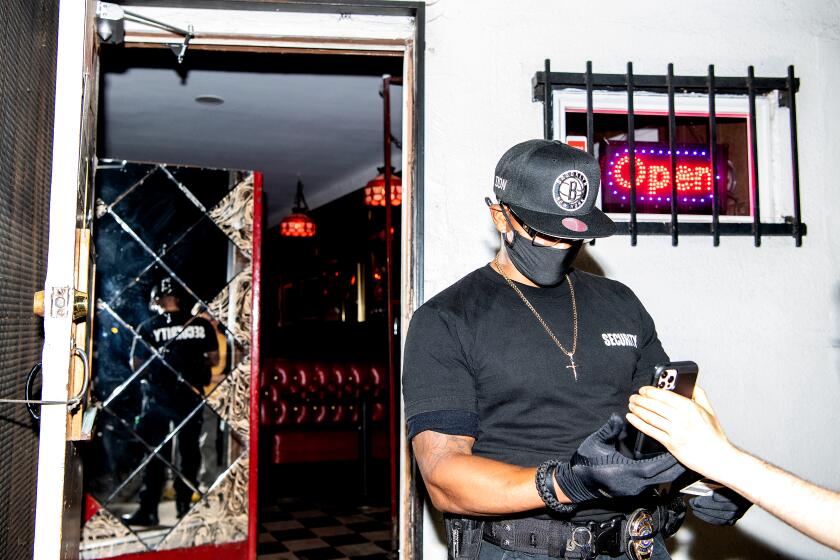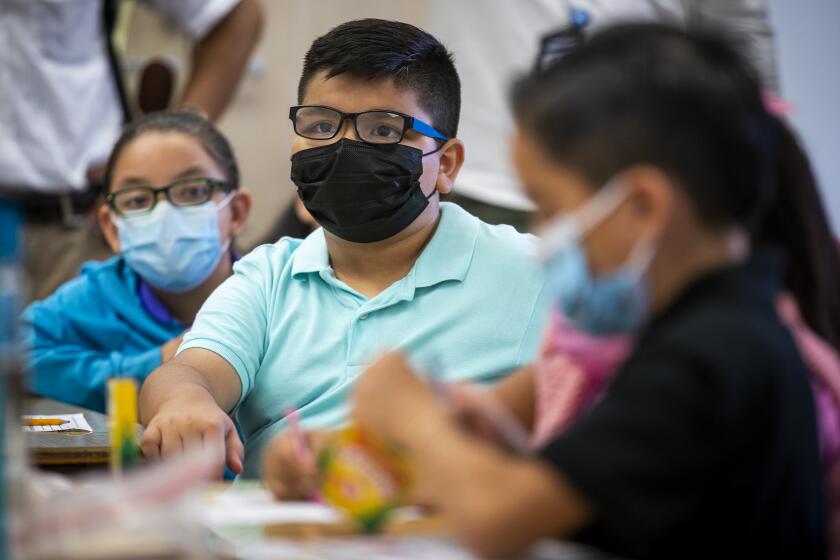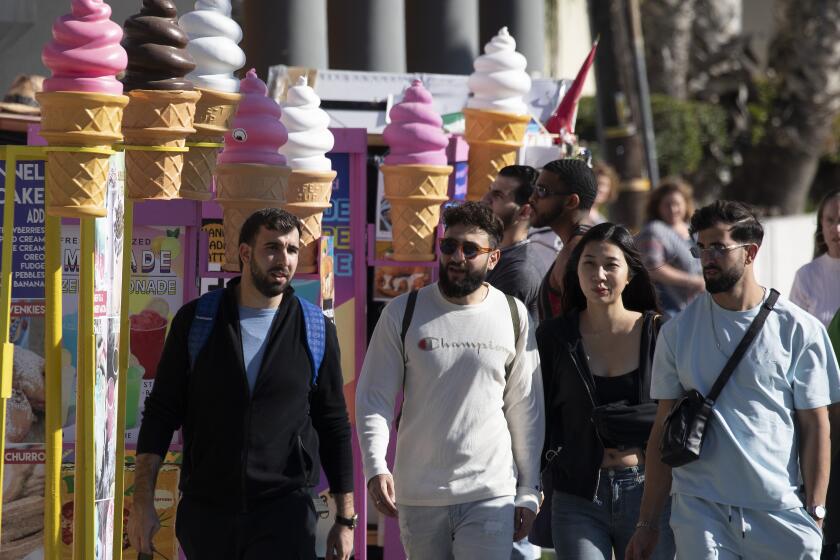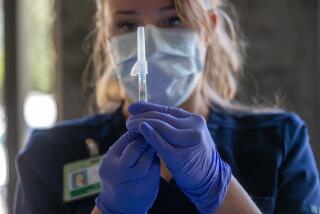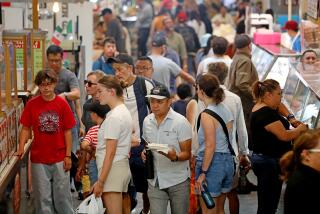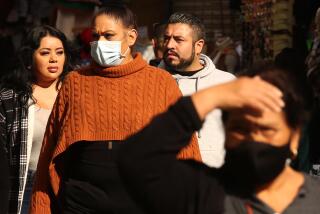Masking rules are easing in California. But it’s complicated
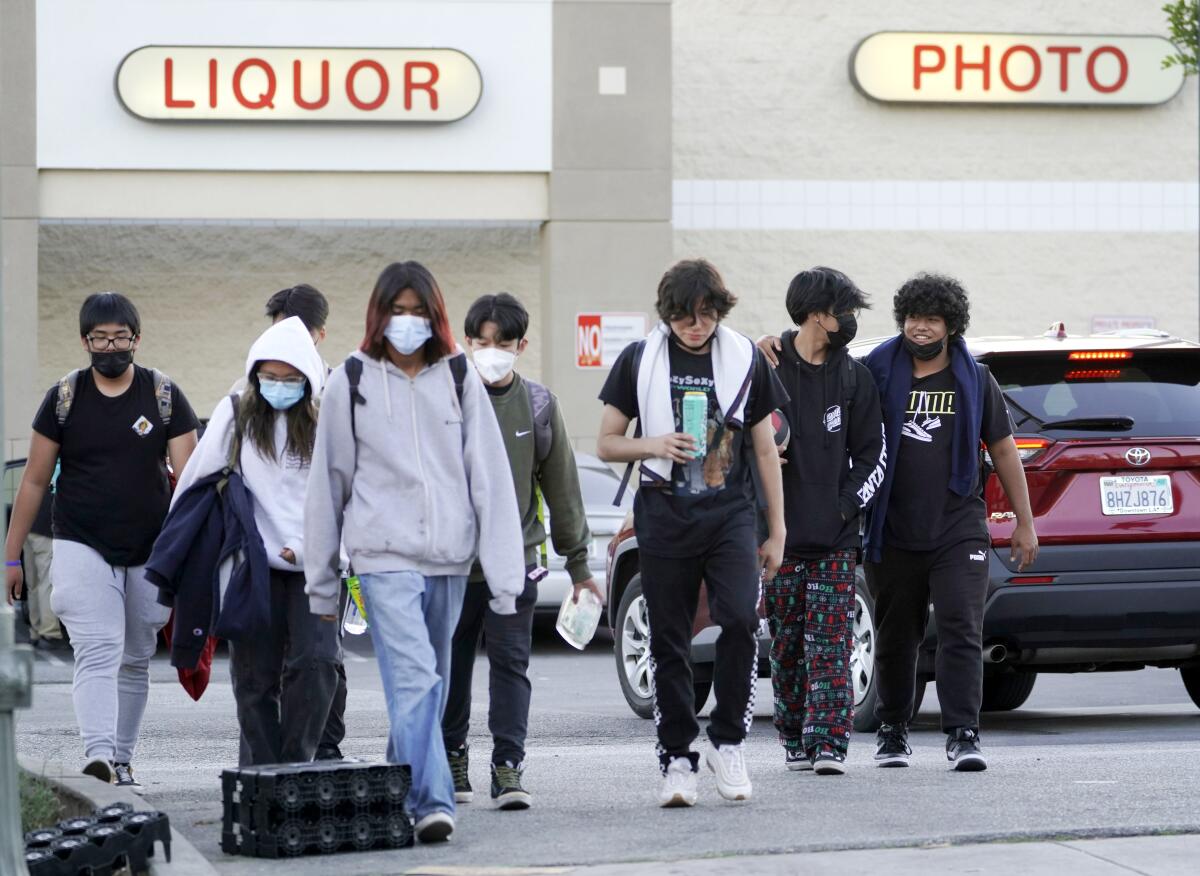
- Share via
As Omicron fades, communities across California are continuing to ease masking rules.
But that does not mean face coverings will suddenly disappear in public indoor spaces. Moreover, many health officials say it still makes sense to wear masks inside, even when there is no longer a mandate, because they offer strong protection.
Health officials announced that fully vaccinated individuals, starting Friday, will be able to shed their masks indoors at Los Angeles County establishments that screen the vaccination status of visitors.
It’s also possible that a faster lifting of the indoor mask mandate in L.A. County could come sooner than expected.
The U.S. Centers for Disease Control and Prevention on Friday is prepared to announce a significant loosening of federal masking guidelines, the Associated Press reported, meaning the vast majority of Americans will no longer live in areas where indoor masking in public is recommended, based on current data.
The CDC’s new guidance could end up affecting L.A. County’s decision on when it would lift its overall indoor public mask mandate, which has been forecast to lift in mid- to late March.
L.A. County Public Health Director Barbara Ferrer said Thursday that health officials plan to look at the CDC’s guidance when it’s released, but it will take at least a few days to evaluate the agency’s newest recommendations. A proposed plan reacting to the CDC guidance will be discussed publicly with the Board of Supervisors at Tuesday’s meeting, Ferrer said.
It’ll probably take a full week to discuss proposed changes to the mask order with business and labor groups, Ferrer said.
Santa Clara County said it was close to lifting its mandate as well, and could lift is mask order by Wednesday if trends continue.
“We’re very encouraged that we’re coming out of this Omicron surge,” said Dr. Sara Cody, the Santa Clara County public health director and health officer. “We are all looking forward to a time where we can remove our masks and feel safe.”
Santa Clara County is one of several in California to retain a universal indoor mask mandate. Los Angeles and Mendocino counties and the city of Palm Springs have also kept their mandates.
The revised rules take effect 12:01 a.m. Friday and will make masking optional indoors in certain settings that screen the vaccination status of patrons.
Here’s what to expect:
Los Angeles County
In L.A. County, the revised rules — which take effect at 12:01 a.m. Friday — represent a significant relaxation of the county’s universal indoor mask mandate, which has been in place since July.
According to the new county rules, businesses interested in relaxing face covering requirements will have two choices: Make masks optional for customers only, or for both customers and employees.
For the latter, workers and patrons alike would need to show proof of full vaccination or a recent negative coronavirus test to enter, and could unmask inside only if they’re fully vaccinated. Those who aren’t fully vaccinated would still be allowed in with a negative test result, but would need to keep their masks on.
Should a business elect to go the customer-only route, patrons would be subject to the same vaccine-or-test verification requirement, but workers would not and would need to remain masked.
Unvaccinated people can still enter establishments with mask-optional policies, unless otherwise prohibited by a more restrictive city rule. Unvaccinated people will need to remain masked and must also provide proof of a recent negative coronavirus test to enter.
The recent negative test must be taken within the last two days if it was a PCR test, or within the last day if it was a rapid antigen test. The test results must come from a lab or healthcare provider with the patient’s name and match the customer’s or employee’s identification; a self-administered at-home test result isn’t acceptable.
Unvaccinated people just making a delivery or pickup, or just using the indoor bathroom, can still enter the business without showing a recent negative test, but need to remain masked.
To comply with the order, businesses will need to demonstrate consistent verification of COVID-19 vaccination status and negative coronavirus tests. At facilities removing the indoor mask requirement for workers, the business will need to maintain a log of fully vaccinated workers and contractors, including the dates of vaccination.
State and federal masking requirements will still be in effect, mandating face coverings in a number of limited places, such as in healthcare settings, indoor K-12 schools and childcare facilities, and public transportation.
The poll suggests broad public support for policies aimed at reducing the spread of the coronavirus in schools, even as protests against mask and vaccine mandates garner attention.
Schools
California officials on Monday are expected to announce a date to lift the indoor mask order in K-12 schools, although counties and schools will have the option to keep their own orders in place if they choose.
Dr. Mark Ghaly, the state’s health and human services secretary, said earlier this month that the decision won’t hinge on any one particular metric or threshold but, rather, on an overall picture — including the trend lines for coronavirus cases, hospitalizations and vaccinations, as well as how the pandemic is playing out elsewhere in the nation and across the globe.
Ghaly expressed optimism that the state will be able to alter its masking rules soon.
“Masking requirements were never put in place to be there forever,” he said. “It’s not a question of if; it’s a question of when.”
A poll conducted this month by the Institute of Governmental Studies at UC Berkeley and co-sponsored by the L.A. Times found nearly two-thirds of California voters, including a majority of parents, support mask and vaccine mandates in K-12 schools.
The results of the early February poll of nearly 9,000 voters suggest continued broad support for policies aimed at reducing the spread of the coronavirus in schools, even as protests against mask and vaccine mandates garner attention in school districts across the state.
At indoor businesses and offices that verify vaccination status, people who are fully vaccinated will no longer have to wear masks starting Friday.
Caveats
Even with L.A. County‘s new rules, it’s likely that masks will continue to be a part of life at indoor public places.
The rules that partially ease the indoor mask order could ultimately prove too complicated or resource-intensive to implement for businesses such as supermarkets and malls. But they may be easier at shops that are already required to check for proof of vaccination.
Moreover, no matter how state or local governments ease mask orders, businesses still can retain their own rules, and officials are still strongly recommending the public continue to wear face coverings in indoor public spaces.
A recent study by scientists at UC Berkeley and the California Department of Public Health illustrated the effectiveness of masks in preventing coronavirus infection.
The study, published by the Centers for Disease Control and Prevention, found that those who always wear a mask indoors are less likely to test positive for the coronavirus compared with those who didn’t routinely wear masks.
Those who wore N95 or KN95 masks in public indoor settings had an 83% lower chance of testing positive, and those who wore surgical masks had a 66% lower chance.
Dr. Clayton Chau, director of the Orange County Health Care Agency and the county’s health officer, said he wears a mask both in indoor public places and in crowded outdoor settings as further protection against a breakthrough infection. He said he wants to avoid getting infected to protect his 86-year-old mother, who is fully vaccinated and boosted but has a weakened immune system.
More to Read
Sign up for Essential California
The most important California stories and recommendations in your inbox every morning.
You may occasionally receive promotional content from the Los Angeles Times.
